The game industry isn’t as inclusive or diverse or inclusive as it could be. But people are working on it. A group of them spoke on a panel at the recent Gamelab game event in Barcelona in June.
Rami Ismail, cofounder of Vlambeer and a frequent advocate for diversity and indie games, moderated the panel. The panelists included voice actress Sarah Elmaleh (Anthem, Gone Home); Kate Edwards, former executive director of the International Game Developers Association and founder of Geogrify; Myiriame Lachapelle, co-producer of GameDev.World and union activist; and Katie Scott, senior game designer at Electronic Arts.
Ismail, Elmaleh, and Lachapelle recently produced the GameDev.World online-only game conference in June. That 24-hour event was simultaneously translated into eight languages, and it was aimed at uncovering new voices in global game development.
The panelists talked about a variety of topics including GameDev.World, crunch time, and unioniziation. Here’s an edited transcript of their panel. (Note: I am on vacation this week, but I’ve got plenty of interesting content for you to read here.)
June 5th: The AI Audit in NYC
Join us next week in NYC to engage with top executive leaders, delving into strategies for auditing AI models to ensure fairness, optimal performance, and ethical compliance across diverse organizations. Secure your attendance for this exclusive invite-only event.
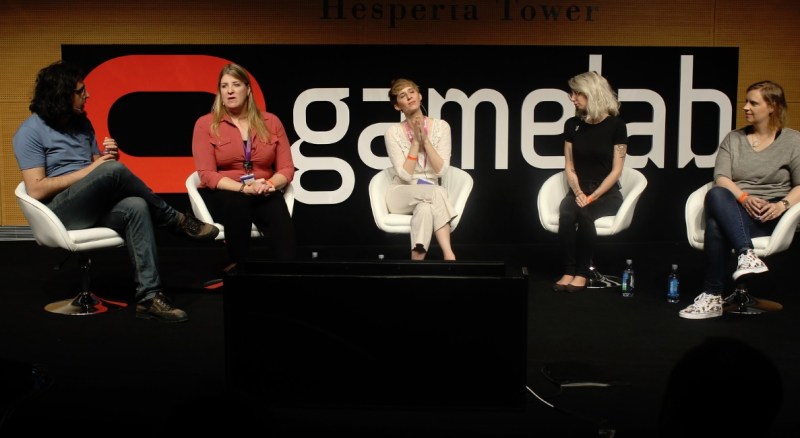
Above: Left to right: Rami Ismail, Kate Edwards, Sarah Elmaleh, Myriame Lachapelle, and Katie Scott.
Rami Ismail: We want to talk a bit about how to make this industry and this medium more inclusive and more just. I’m sure I don’t have to explain to all of you the feeling of not always being in the best place to be part of the games industry. Spain has an incredible games industry, but compared to being in the United States or in England, there are challenges you have that they don’t have. That feeling is true for other groups of people as well. We want to talk about how to open up the games industry to as many people as possible.
We obviously have very different views on the games industry. I think the best way to kick this off is to ask, what kind of efforts do you think are important? What kind of things are you focusing on in our industry to make it more inclusive?
Kate Edwards: My perspective on this issue is that it’s the cornerstone of my career in the game industry for the past 26 years. As a geographer, I’ve been in the industry doing culturalization work. Essentially, what I do is I help game developers adapt their content to other cultures and make sure there’s nothing in their content that’s going to be problematic. We’re going to make sure the content meets local expectations as best as possible.
Sometimes those local expectations are defined by the government. They have rules about certain things you can or can’t show. But it’s more than that. It’s not just about ratings board and things like that. It’s more about, what are the cultural mores and values of that local culture, of that country, of that region, whatever you define it? Can we make sure that the game content is being designed in a way that’s going to be compatible?
I want to make sure that when game developers are creating—they have their creative vision. They’re doing what they’re doing. But making sure their vision is going to be accessible to as many people in the world as possible. I don’t want game players, for example, to be playing through a game and having a great time in some massive RPG, like Skyrim or whatever it might be, and all of a sudden they see a symbol or a gesture or someone clothed in a way that’s relevant to their culture, and then that person or that symbol is being misused or appropriated or somehow used in a way that’s jarring to them. It basically knocks them out of the experience of having fun and being immersed in the world. That’s what I try and avoid. I help game developers make sure that doesn’t happen. I want to make sure everyone feels welcome in that environment, whatever culture they might be from.
Now, in that process, of course, game developers have their own creative vision. They have a choice. They can always decide that they don’t want to take something out, they don’t want to change it, whether it affects that culture or not. That’s their decision, and that’s fine. They are the ones who own that and they’re accountable for that. My job is to just make sure they’re aware that this could be a potential problem, and that if you leave that issue in there, whatever it might be, you’re actually excluding people from the experience.
From my perspective, I take a very broad, global perspective on this. Yes, I dive into different cultures and different issues in various regions, but my job is to make sure the content can maximize its reach and go everywhere possible. That’s the perspective I’ve taken on.
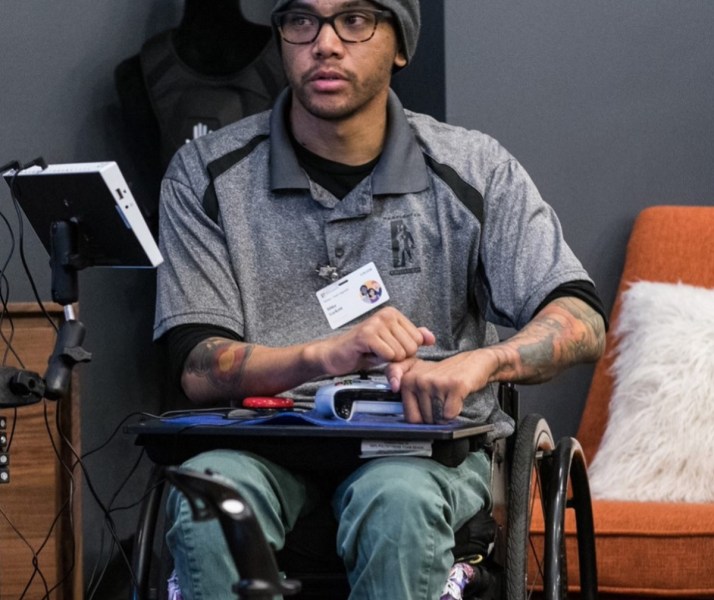
Above: Mike Luckett was a beta tester for the Xbox Adaptive Controller.
When I first started out doing this work at Microsoft, back when I was there a long time ago, I first was using the argument that we’re doing this because it’s the right thing to do. We want to respect our local customers. We want to respect who they are as people and as cultures. That argument didn’t go anywhere with anybody. [laughs] Eventually I had to monetize the argument, as you have to do with a lot of these things. My advocacy in making sure content was accessible had to be expressed through the fact that if you do this, your game will be accessible in more places around the world, and therefore you maximize your revenue. You’re going into more markets.
When I used that argument, then, of course, a lot of the biz dev people said, “Oh, that makes perfect sense. Of course, we’re going to do this.” But even then it took us several bad mistakes, very public mistakes, for people to finally get on board and understand why this is important.
Sarah Elmaleh: As a voice actor by trade, most of the advocacy or community-building I do comes from there. I’m also working with the actors union in America, SAG-AFTRA, to develop new contracts and increase and enhance collaboration between indies, especially, who don’t often have access to voice actors or understand how to work with them, so that there are new contracts for them. I’m doing more consulting with developers, especially indies, to understand how actors work and how to work best with them.
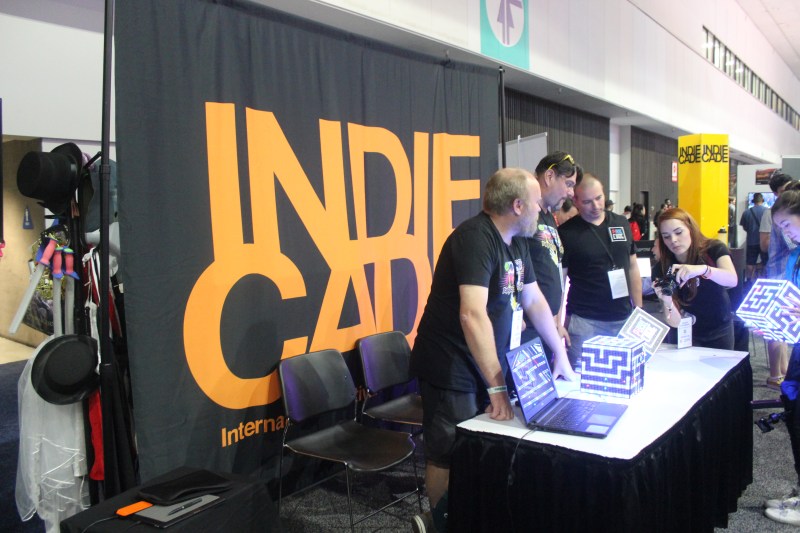
Above: Indiecade booth at E3 2019
Even within disciplines in the game community, I’m creating conversation and making a bridge where people are often isolated from each other. That’s close to home from the voice acting perspective. But then working with IndieCade, I’ve been an event organizer, and now an awards show host and director. I’m making sure that all of these different kinds of games, whole different genres of games, are feeling included and part of the same community and celebrated properly for inspiring each other and cross-pollinating with each other.
It was that experience, working with IndieCade, through which I discovered a language barrier issue with one of our developers. I started talking to Rami about GameDev.World and that extra layer of diversity that’s about language and culture. It’s true with voice actors too. It’s not enough to just be included in an event. It’s not the same as being integrated into an event. It’s not enough to say that’s someone’s here. Is there genuine curiosity and interest and collaboration happening between these people? It’s not enough to extend an invitation and leave it at that. That feeling and awareness expands across acting and other disciplines in development, and developers as a larger global community.
Ismail: IndieCade is one of the larger independent games events in the U.S.? There’s three of them nowadays, right?
Elmaleh: Yes, there’s three. There’s IndieCade Europe, IndieCade East in New York, and IndieCade in Los Angeles.
Ismail: And awards are open to anybody, just as a reminder for all of you. Send your games to IndieCade. Myriame?
Myriame Lachapelle: My work locally in Montreal — I’ve been involved with Game Workers Unite. I’ve been learning about game rights and labor rights, trying to teach game developers about their rights as workers. As many of you probably know, crunch is bad. We work crazy hours, and often people don’t know about — you can have a vacation. It’s normal to be sick sometimes. You shouldn’t have to go to work when you’re sick, because you destroy your health. In Montreal I’ve been having a few campaigns to help developers, both indie and triple-A, to know about what’s right for them and how to fight their bosses.
With GameDev.World, which happened last weekend, a big thing for me was trying to spread knowledge from people around the world to other people around the world, trying to break the language barrier and have people in their local areas speaking their language — for those who don’t know what GameDev.World is, it’s a free online event. We were live translating every single talk, 35 talks, into different languages – Arabic, French, Spanish, English, Russian, Chinese, and Japanese. And we made it.
Ismail: For Game Workers Unite, one of the common topics you said you come across is that even though people have a lot of rights, they’re usually just not aware.
Lachapelle: Right, they’re not aware. Even me, I thought, “Wow, I should be paid for my overtime after 40 hours? I didn’t know that.”
Elmaleh: That’s one of the things I’m most excited about with the actors union. Some of you may not know that American actors were on strike, asking for different working conditions, better working conditions. Just in the year or two since then, the attitude toward labor rights, in general, has shifted dramatically, at least in America, in game development. Now SAG-AFTRA is partnering and advising. They can’t organize developers, but they can share their knowledge and experience. I’m excited to see that happening.
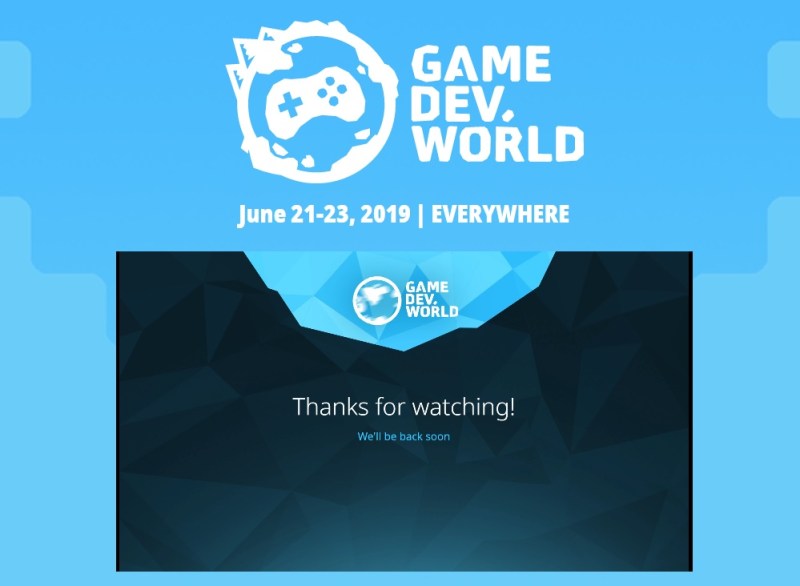
Above: GameDev.World aired 24 hours of game developer talks in eight languages.
Lachapelle: Sharing knowledge is very important for our industry. We need more transparency around how much, say, a game designer is paid. I’ve been doing a bunch of talks to students at universities. Often, especially with big triple-A studios, they’ll hire students fresh out of school at super low rates because we don’t know better. We need to be more transparent about a lot of things, about everything.
Ismail: Katie, your perspective is that of someone who works in a large company, machine, organization, whatever you want to call it. What are you experiencing there? What do you work on?
Katie Scott: As you mentioned, I’m a game designer at Electronic Arts. I’ve had the opportunity to design a lot of games, I think 10 or 11 at EA, including the last four FIFA games. I consider myself to be a very typical game designer in that my role is to design features for people to have fun with. But in the last five or six years or so, I started noticing that maybe as game designers we weren’t doing our job as well as we could because we were very insular. We were very echo chamber-ey. We were focused on what we believed was the truth of the industry.
Lately, I’ve been focused on trying to rally my game design community on a couple of concepts. The first one is empathy, which is something I talk a lot about, just the knowledge that your experiences and your opportunities and the things you’ve encountered in your life are different from what everyone else has. As game designers, our number one goal is to bring joy to the world through gaming. We need to have extremely deep empathy with other people and think about other people, think about what they go through.
The second is challenging our assumptions, which I believe is also in line with empathy. As humans, we’re very — we have fragile egos. We all have confidence issues. We don’t want to be wrong. But we need to make sure that what we’re basing our decisions on is actually true. To give some examples, I believe that — maybe not in this room, but in many rooms I’ve been in, if you ask who is the prototypical gamer, many would say younger Caucasian males, when in fact they’re not the largest gaming demographic, not even by a long shot. There are many, many other, larger gaming demographics, including women over the age of 35.
The third is the psychological safety to be wrong. When we’re pursuing this space, wanting to include more people, to understand their perspectives and try and do a good job for them, it has to be okay to get it wrong. For example, I’m from Canada. We have indigenous people in Canada that can sometimes be called “Indian,” which actually isn’t the correct term because they’re not from India. They’re from Canada. In my own design recently, I used the word “Indian,” and someone pointed that out to me. I was pleased to see how very little flak I caught for it. Obviously, my intention wasn’t to get it wrong. I think the culture, at least at my company, the culture I’m trying to spread, is that it’s okay to try things. Your intentions aren’t going to be misconstrued.
I’ve been working lately on lots of things at EA, particularly on FIFA. I developed a framework that EA is now using company-wide to help with diversity within our games, mainly around characters. Characters, heroes, things like that, looking at how we can do a better job with characters within our game. We hope that we can expand that over time. Next would be accessibility, abled gaming, and then obviously attracting more diverse developers within our industry.
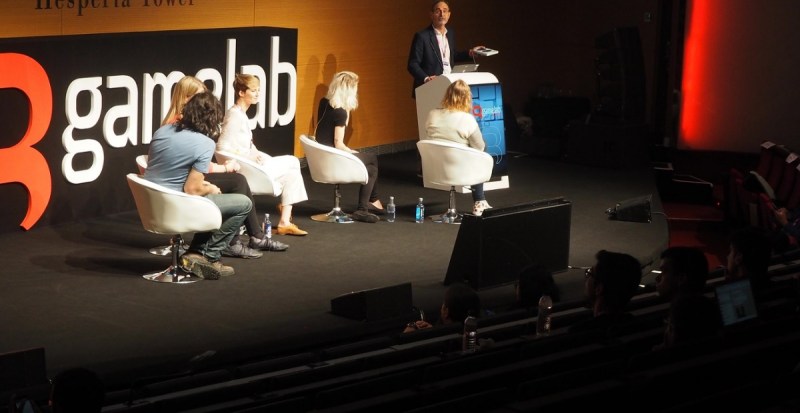
Above: Mick Donegan of Special Effect addresses diversity panel at Gamelab.
Ismail: That touches on an important part of this, which is having different ideas, different perspectives from the industry in a room is important for making good choices. It’s not just a thing that we do because it’s nice, or it looks good. It’s because it makes better games. It makes better products. It makes a better industry, a fair industry.
Are there any initiatives or pushes that you’re involved in that you think are things that people in this audience could learn from or implement things from? Obviously having those three examples is good thing for people to look at their own studios, their own companies, their own projects and say, “Here are some things we can improve.” Most of you here are independent developers? Raise your hand if you’re indie? Triple-A? Students? Cool.
For the people here, aspiring game developers, independent game developers, do you have any tips as far as looking for diversity and inclusion
Scott: The thing that’s worked the most for me — as you say, I work for a really big company. In fact, I worked on what I would consider to be all the most, you might say, masculine titles at EA? I worked on Battlefield, Medal of Honor, Need for Speed, and sports.
I’d say the thing that’s helped me the most and gotten the most traction is using questions as a way to lead to someone feeling like they’re not being attacked for what they’ve done with their decision-making. Instead of, “This character is crap, I don’t believe this character is authentic, and we need to do something with this,” I would say, “What have you done to ensure this character is authentic?” If the answer is, “Well, nothing,” they have that realization themselves. I don’t have to push in a negative way.
I talked about psychological safety being something important. Using questions as a way to educate has been a really soft and comfortable way to pursue this area.
Lachapelle: I feel like what Katie pointed out earlier, about having the space to be wrong, is something very important. If you want to be inclusive you’ll make mistakes. You’ll fail. But one of the most important things is accepting that you can make mistakes, accepting that you can be wrong, and learning from it.
Reading and learning are also really important. Every time I talk to students — I’m talking to a few of you now — ask questions of senior developers. Never be shy. Just ask. “Hey, how much money do you earn after how many years of experience?” Trying to have data about how the industry is doing right now, because the industry changes so fast, all the time. What was true last year, most of that isn’t true now. Always be curious about changes and trying to understand where the industry is going.
Allow yourself to be wrong and then learn from it. It’s true even for someone who’s been in the industry for years, just as for someone who’s just entering. And never be afraid of being a bother to other people about asking questions. We all started at some point. We were all naïve and very excited to be in the industry. But be nice.
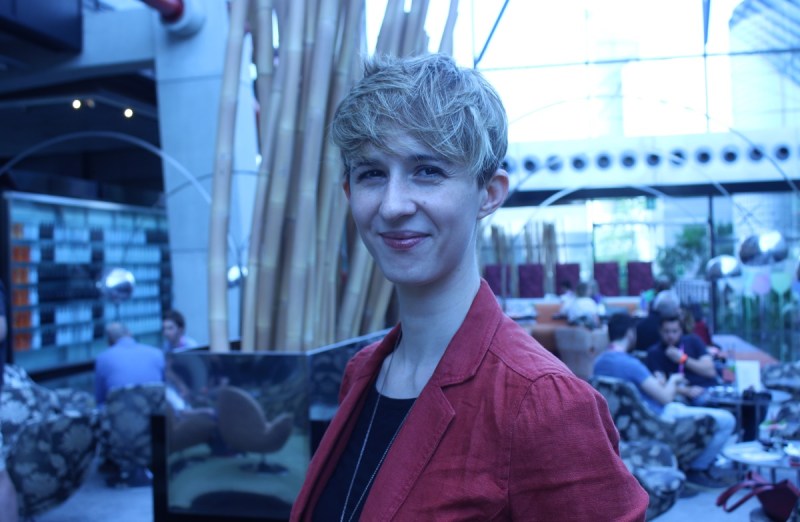
Above: Sarah Elmaleh is a voice actress in video games and co-organizer of GameDev.World.
Elmaleh: There’s this theme of curiosity, that empathy comes out of a genuine belief that someone else has something interesting and exciting to share with you and add to your game. I saw a lot of students. Be sensitive to the fact that great ideas from a game can come from anywhere and anyone, whether that’s on your team, or people in your life, or people who do other kinds of things. Especially in university, working with people in your theater department, working with people in architecture — games contain all of these disciplines, which is what makes them so exciting. See everyone, everywhere as a source for something that could be really exciting to you as an artist.
As a motivation, that keeps the impulse really clear and really exciting. It’s not just an obligation anymore. People who do different kinds of work, people who come from different backgrounds, everyone plays games. Your audience is very big now, and all the things you say will have an ear. Coming from that place of curiosity is an exciting way to engage with this initiative, across the board.
Edwards: A couple of things that I would add, from two different angles. The first thing is to recognize that everyone in this room is biased. We’re human beings, therefore we have a bias. We’re born with it. We grow up with it. We’re taught bias. We adopt bias based on where we’re from, the culture, the geography, everything about it. I see bias all the time, showing up in game design. I see it in the hiring practices in the industry. I see it in all kinds of manifestations.
The key is we have to be very conscious of our own bias. Really look in the mirror and be introspective about what kind of beliefs we hold that hold us back from accepting this person, that person, that viewpoint, from being open-minded. Not only just in our game design — for example, I demonstrate better diversity and inclusion in my game characters if the narrative warrants that – but also in the makeup of your company, the makeup of the people you hang out with. All of that informs your creative energy. When you surround yourself with diverse people, you definitely surround yourself with different viewpoints. All of that informs.
For anyone who’s an artist, for example, you probably — if you went to school for art, you took art history classes. I did at one point, back in my past. The whole point of art history class is to show you the diversity of human art from across the entire globe, and inform you about all these different styles that have taken place. In the same way, we have to recognize the fact that we might have a set way of looking at things, but it may not be the right way to look at things. That’s why a lot of companies like Facebook and Google and others in the tech sector in recent years have focused on the issue of unconscious bias in their company, in their hiring practices, because it’s become a really big issue as it affects inclusion.
The other part I would mention more from an advocacy standpoint to the point about Game Workers Unite and labor issues, there is a sense of justice in this industry that is coming. Everybody who is going into this industry or who is in it now needs to recognize that there is a wave of change that’s inevitable. Whether it’s implemented by Game Workers Unite or other initiatives or the legal defense fund I’m trying to get off the ground by game developers, there is a sense that’s time to change the way we manage production.
My advice is essentially, if you’re in an indie company, or even in a larger company, do the right thing. Remember that evil triumphs when good people do nothing. Don’t do nothing. Think about how you can be an agent of change, no matter where you are.
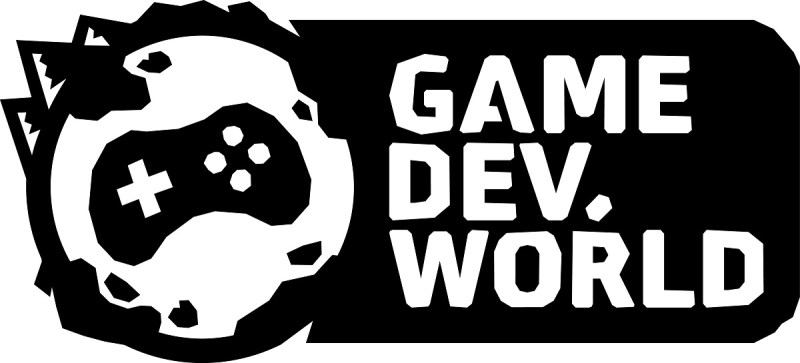
Above: GameDev.World is a new online only conference.
Ismail: Obviously there are a lot of things that people can do when they want to change things. For the audience, if there’s somebody in the audience that comes across something that is unjust, that is wrong, or that they feel excluded by, are there any tips that you’d have for how to deal with that? It’s a common problem, obviously. People run into these walls whether they’re women, whether they’re non-white, whether they’re not straight, whether they’re dealing with being a Spanish-speaking country in an English-speaking industry. There are ways people are excluded. What do you recommend if you’re feeling excluded yourself?
Edwards: One thing I would just briefly is that you should learn to be constructively blunt. You should say something. Don’t be silent. That’s number one. But if you do speak up, make sure you’re constructive, but be blunt. Be honest about how this is making you feel. Be honest about the effect of this on you or people you know. But you have to be constructive. Most people, we hear negative feedback or people calling us idiots on Twitter or whatever, and we don’t listen to that. People don’t listen to negative feedback.
You have to be constructive. “Hey, I love your game, but here are some things that bother me, and I’d recommend you do this instead.” Give that kind of constructive feedback. People are much more apt to listen.
Elmaleh: That’s the key thing. No one wants to feel like they’re not a nice person. It’s a very uncomfortable feeling to feel — look, I’ve grown up this way. I’m consistent with this value system. How can you tell me I’m a terrible person? I know myself to be nice. I know myself to be caring. And so then that delicate thing of saying, “Hey, look, you may not have been able to see this, but this behavior affects people in this way, and it might even be more consistent with your value of being nice if you add this layer to include people in your community more safely.”
Being aware that many people do see themselves as nice and allowing them to have that feeling, and then to find a way to work together to feel like you’re on the same page, I think that’s a place to start from. Having good faith, I think, is a good part of it, but setting the boundary really clearly. Because the loss is real. I come back to the right motivation for doing things. Human loss from the space is creative loss from your game, a loss of your audience. What we lose when labor conditions are bad or when people are feeling excluded is games. We’re losing games. If you care about games and being inspired by games or making them or having them played, that’s the kind of purity of why you try to extend yourself and put yourself into uncomfortable situations to include more people.
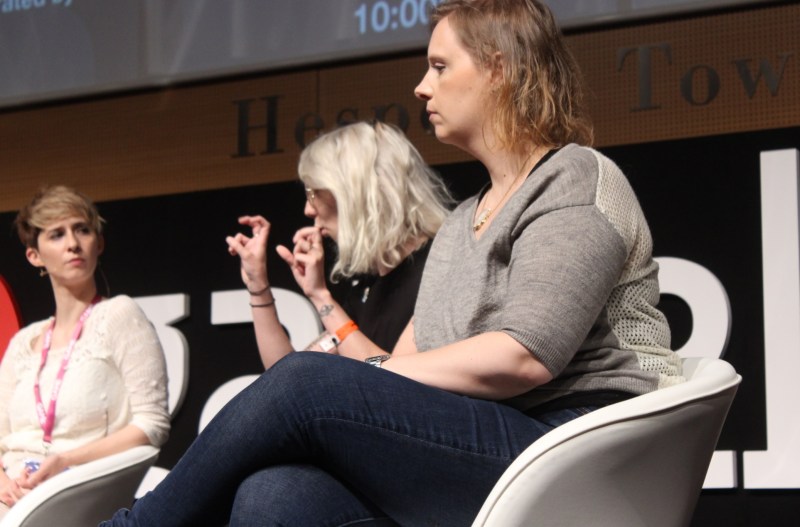
Above: Katie Scott spoke on a panel at Gamelab on inclusivity.
Scott: This is a long game. We’re at the beginning. This is the dawn of this recognition within our industry. If you always stay on the side of what you know is right and what you know is going to help other people, you’re going to take your lumps. There will be times when you’re going to softly confront someone about what they’ve said or what they’ve done, and you’re not going to get the response you want.
It may even lead to your career not doing what you want it to do because people think of you as a shit disturber, which is a fear that I have, and I have had. Kate and I were speaking last night about some things that occur in my workplace. I’ll come into work and think, “Today is going to be the day that you’re not going to send a ranty email.” [laughs] You’re going to be quiet and mature. And by lunchtime, I’m already writing it all down.
Ultimately you have to be real. You have to be yourself. You have to know what you believe is right and you have to pursue it. It will turn out in the end, because our journeys are obviously not these amazing — it’s not here to here and it goes really well.
Lachapelle: To your point, Sarah, about the way we use games — I wanted to push further around, it’s important to fight for what we think is right, because at the end, we’re losing games, but we’re also losing people who make games. The longest that someone is in the game industry on average these days is what, five years? People burn out. People get tired of overworking themselves.
I’ve been learning — again, by talking to students – that crunch starts at school. They’re overworked at school because when you’re a student you probably have to have a part-time job while you’re going to class full time. You learn from the industry because this is how the industry is. You have to work 80 hours a week to make a game. And that’s just not true. If you have a teacher telling you that you have to work 80 hours to make a game possible, because that shows you’re passionate, that’s bullshit.
If you want to fight, you have to fight for yourself, but also for your peers. We’re all in this together. We all want to have justice. We all want to make the industry as a whole better for everyone. I know that the work I’m doing right now with Game Workers Unite, I’ll probably not be the one who benefits from it. I’m already deep in the game industry. I’m old. [laughs] But I know that all of work will benefit the next generation and the generation after. I feel like I’m not really fighting for myself. I’m fighting for everyone else.
You mentioned being blunt about what you think is right. I gave that advice to a few people back in Montreal. If you want to go talk to your boss about something, always have paper trails behind what you’re talking about with your manager or other people. Try to have a buddy with you in meetings. It’s hard to fight by yourself, having a one-on-one fight with management. Having someone that’s with you, that can be accountable for you and help you — a lot of the time, when you have one-on-one meetings with your boss, they can try to gaslight you. “No, that never happened. I never told you you’d have a raise.” Always try to keep solidarity.
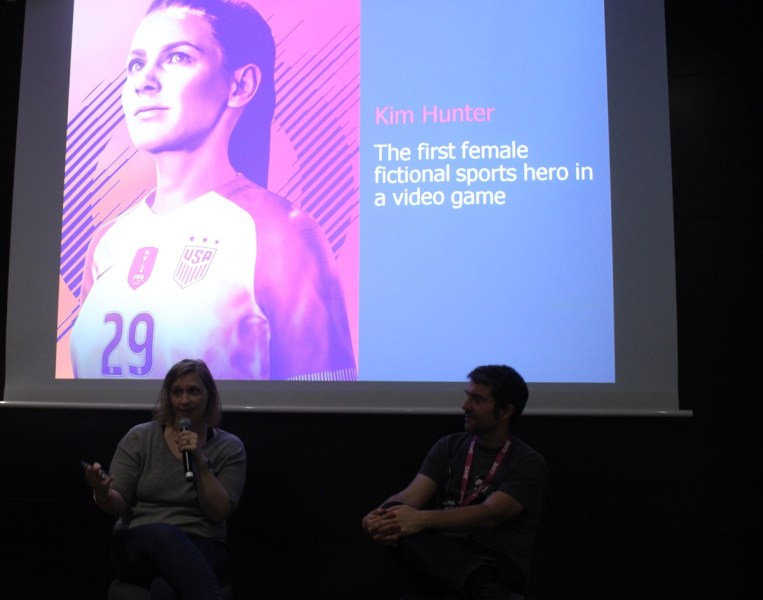
Above: Katie Scott (left) speaks at Gamelab about female characters in soccer games.
Elmaleh: Solidarity helps reinforce your courage. This takes a lot of courage. It takes courage to speak out and it takes courage to receive correction, in both directions. Feeling that sense of community around you and deepening your conviction — I think that conviction comes before courage. You have courage on the basis of believing this is important and true, no matter how many stumbles you take to get there. The best way to do that is to feel a sense of community and alliance with your fellow creatives and your fellow teammates, or other people who believe this is an urgent thing to do.
Ismail: In your answers, I heard the words “fight” and “courage” a lot. These are not easy things, as Myriame just pointed out. Obviously, for a lot of people in the audience, and for myself, we want to do things right. Katie touched on the safety to be able to try things. These are difficult things. It’s not always easy. It’s not always going to go right. Is there any encouragement you want to give people before we wrap up? Why this matters and why they should fight.
Edwards: From my perspective, when I give talks related to these issues around advocacy, I often use the term “righteous rage” as far as describing my feeling. It’s not enough to be angry. A lot of us get angry about a lot of stuff. You just have to look at Twitter to find angry people about all kinds of things. But anger without direction is worthless. There’s nothing wrong with anger, but anger needs to be focused. It needs to be focused in a direction of a solution.
That’s why I talk about righteous rage. Yeah, sometimes maybe that’s not the right term to use, but it resonates with me because I know that I do believe that certain things are always right or always wrong. It’s always wrong for a publisher to screw an indie on a contract. It’s always wrong for management to force people to crunch ridiculous hours. It’s wrong when companies purposefully try not to be diverse and inclusive in their content and in their workplace. These things, to me, are always wrong.
I know that part of what drives me is taking on this idea of being a creator advocate, not some kind of warrior poet. You’re not just creating games. You’re also advocating for a whole new future because games are the current evolution of human narrative. That’s what you do right now. It’s not an insignificant thing. We take that seriously and we take on this idea that I’m not just creator. I’m also a creator advocate. I know that certain things I’m doing are right.
There will be failures. There will be pushback. There will be criticism. There will be a lot of things that are difficult. But as long as you hold on to the notion that what you’re fighting for is right, this is the right thing to do regardless. That’s one of the things that helps me stay afloat. Along with that is doing it collectively, as you mentioned before. Doing it collectively is important because if you know you have a whole bunch of people doing the right thing together, it’s hard to not feel supported.
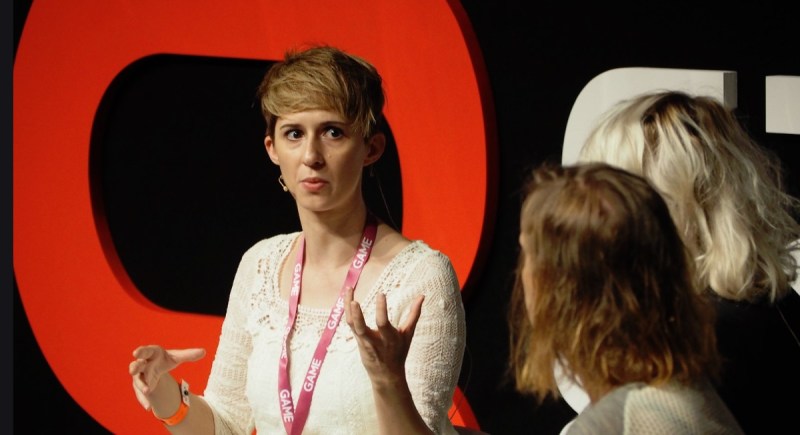
Above: Sarah Elmaleh has been the voice of characters in games like Gone Home and Anthem.
Elmaleh: It’s so funny that you talk about righteous rage because I feel there’s a distinct split in my personality. For advocacy, I tend to be extremely soft and take everyone in the best possible faith and believe that we both have the same goal. We’re just going to talk it out and figure out how to get there. But in games, I always get cast for righteous rage. [laughs] I feel like maybe I just put that part of my feeling into games and kept it separate. The Viking raider in For Honor is all about righteous rage. That’s funny.
But I do think there’s room for both styles. Sometimes you need people to heal and to be patient, and sometimes you need people to rail and be firm. Find which one speaks to you that comes to you more naturally. Pair with other people, so that every context has the right person to do the job. When someone says, “Hey, no, you’re acting in bad faith, and I need a warrior now,” you have a warrior now. When someone is saying, “I’m trying really hard, I’m just making mistakes, and I feel really isolated because no one’s being patient with me,” be that person. I really do think it takes all kinds of people to move this forward. Different contexts call for different things.
Scott: Recognize the maturity of whatever entity you’re dealing with. If your company or your school or wherever you’re working is not super-woke on this topic, you can start a little bit smaller. You can start with something that’s an easier change, instead of going straight for the throat, because obviously, all you’re going to get is pushback.
Lachapelle: Starting small, slowly building the trust that collectively we can change things. What about free coffee? And then going further. What about a raise for everyone? It’s a good point, starting small and building on that.
I’m not sure if I’m answering your question correctly, but I’m very open to talking about mental health in games. We don’t take care of ourselves. Everyone in this room is bad at taking care of themselves. [laughs] Fighting, just being angry, it’s very tiring. It’s important in those fights to know about how to take of ourselves. You will get tired. You will get overwhelmed. You’ll cry and be angry — at yourself, at other people. It’s important to take a step back sometimes and let others take the fight for you. Recharge. Read more about whatever the issue is. The more — not relaxed, but the more rested you are, the better you can fight after that. Then someone else can step down and take a rest and then go back and fight with you. It’s very important to take care of yourselves.
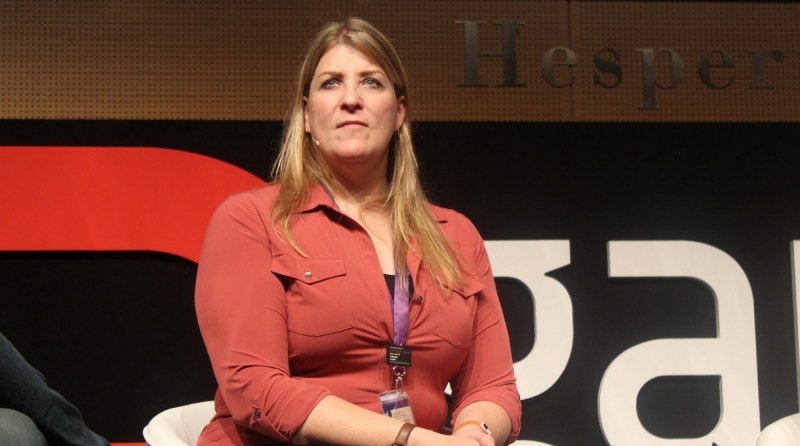
Above: Kate Edwards of Geogrify.
Elmaleh: Talking about it is how you attract people to see each other and feel that sense of community. If you feel these things, start talking, and you’ll find each other. Pay attention to who’s saying these things and connect with them. Feeling seen is the first step to building that community that gives you the collective resource to do good works.
Scott: Your question was about encouragement. When I started on this journey, I couldn’t have even imagined where it would take me. I mentioned last night that being involved in this space is a privilege. It’s a privilege to pioneer something that’s never been done before. Most people in their lives will not get the opportunity to change something for the better, for humanity. I encourage you to get involved in this because it’s been such an amazing thing for me. The reason I’m here on this stage is because I decided I would get involved.
This topic is ripe for your involvement, especially if you don’t actually feel underrepresented. I’m desperately waiting to encounter someone who is actually on the side of this and is approaching it through empathy, rather than their own personal experience. Those people especially can make this a really big deal. It’s fun. It’s cool. Come with us.
Ismail: For all of you, just from me personally — our medium right now is probably the most important medium on the planet. I don’t know if you remember when you first started playing games, but there must be that one game or that one thing that connected with you, that made you feel like, “Oh, I could make this. I can do this. I can be part of this.”
I think what all of us are talking about is making sure that for everyone, there is that game. But then also, when they look at our industry, they see somebody that looks like them, that sounds like them, that thinks like them. Not only do they see a game and wonder, “Can I be part of this?” but they see the game, take one look at the game industry, and they know they can be part of this. For the future, we’ll have all types of games from all types of people.
Disclosure: The organizers of Gamelab paid my way to Barcelona. Our coverage remains objective.


